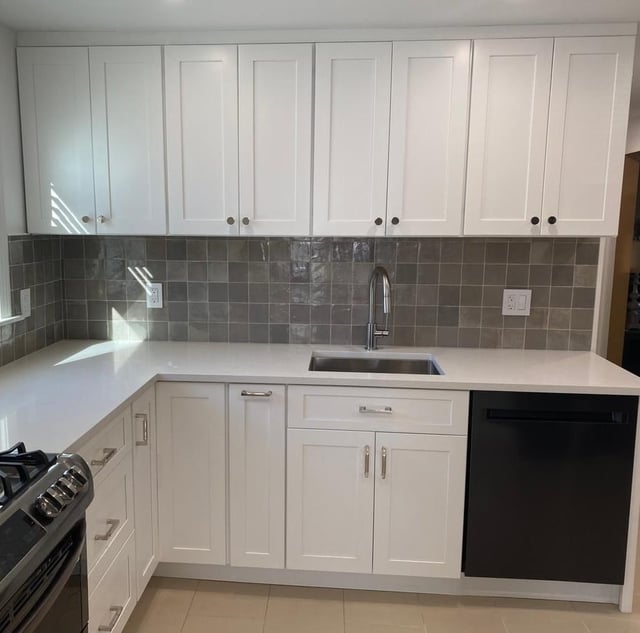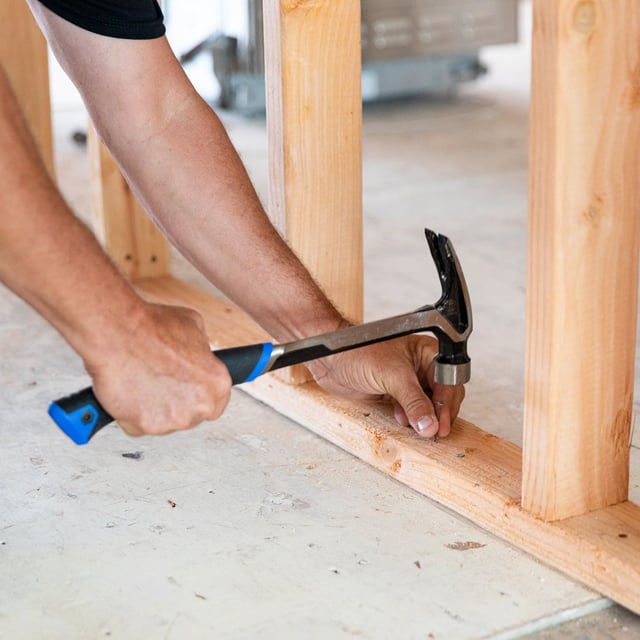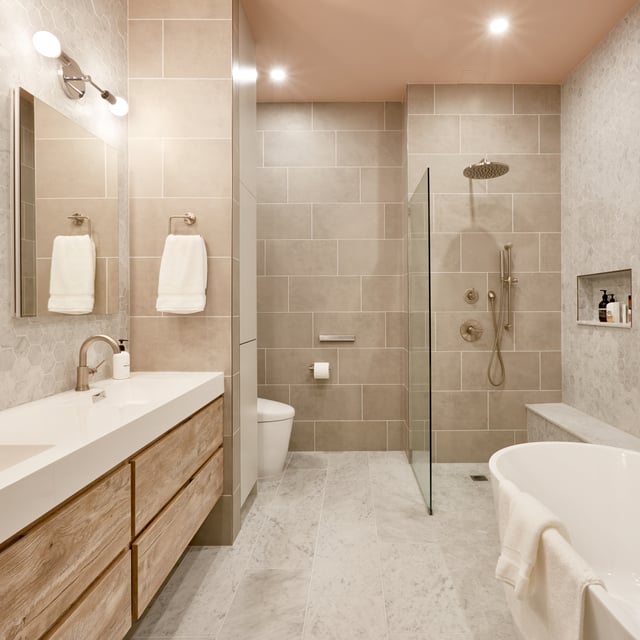
Home Addition
Pembroke + Hanover, MA Home Additions Guide
11.11.2025


In This Article
Renovating a home in Boston can be as exciting as finding the perfect Dunkin' order. But when it comes to crunching the numbers, things can get a little overwhelming. From historic brownstones in Beacon Hill to sleek lofts in the Seaport District, home renovation costs vary depending on the size of your project, the age of your property, and those inevitable New England quirks (looking at you, century-old plumbing!).
Whether you're planning a gut renovation or just giving your space a fresh facelift, we will walk you through everything you need to know about budgeting for a home renovation in Boston. We'll cover everything from detailed cost breakdowns for various projects to factors that affect pricing. Plus, we'll share some handy tips to help you stay within your budget and make the most of your renovation plans.
As we dive into 2025, the home renovation landscape in Greater Boston is bustling with exciting trends. Boston home remodeling trends for 2025 highlight a growing interest in sustainable and energy-efficient upgrades, ensuring homes are not only stylish but also environmentally friendly. With a mix of modern and classic designs, homeowners are transforming their spaces to reflect Boston's rich architectural history while adding contemporary flair.
In 2025, the desire for home renovations in Greater Boston is stronger than ever, driven by an increased awareness of sustainable and energy-efficient upgrades. Homeowners are investing in solar panels, energy-efficient windows, and upgraded HVAC systems to not only reduce their carbon footprint but also save on utility bills. These changes reflect a broader trend where more people are becoming eco-conscious and want their homes to align with these values. It's all about making smarter choices that benefit both the environment and the homeowner's wallet.
When it comes to design, Greater Boston homes are embracing a variety of popular styles, each with its unique charm. Many homeowners are opting for the modern farmhouse look, which blends rustic elements with contemporary design. Meanwhile, the timeless appeal of colonial and Victorian styles continues to capture the hearts of those who admire classic elegance and intricate details. This mix of styles allows homeowners to infuse their personal taste into their homes, creating spaces that are both beautiful and functional.
The Boston real estate market in 2025 is seeing skyrocketing property values, which plays a significant role in driving up renovation costs. As property prices climb, homeowners are more inclined to invest in renovating their current homes rather than purchasing new ones. This trend is great for maintaining and increasing property value, as well-renovated homes often command higher prices in this competitive market.
Additionally, with interest rates on the rise, more homeowners are choosing to upgrade their existing homes instead of moving to new properties. Renovations offer a practical solution to expanding or enhancing living spaces without the hassle and cost of a full relocation. This shift encourages homeowners to focus on making their current spaces meet their evolving needs while capitalizing on the investment they’ve already made.
Get matched with Block-vetted Boston contractors

Mark
MRCR DBA Quality Contracting 4.5

Ion
Art Deco Enterprises 4.6

Alberto
XP Contractors Inc 5.0

Isli
SABI Construction USA Inc 5.0

Sanuar
A Better Plus Construction Inc 4.6

Sara and Ernesto
American Precision Developers LLC 4.8

Mladen
Petarson Renovations 5.0

Elias
Big Foot Contracting 4.5

Steven
Terranova Construction 5.0

Gad
Golden State Designs 4.9

Leonardo
Andes Project Contractor Corporation 4.5

Juan
Fancy Construction 4.9

Joseph and Anca
QB Construction Inc 5.0

Piotr
Peter Renovations Inc 4.8

Harold
AAA Construction Services, LLC 5.0
When planning for home renovations in Greater Boston in 2025, understanding average costs is key to making informed decisions. With Boston's housing market continually evolving, renovation expenses can vary widely based on the size and scope of the project. By gaining insights into what these costs entail, homeowners can better budget for their dream homes while navigating the region's unique financial landscape.
|
Renovation Type
|
Cost Range
|
|
Full Home (< 2,500 sq. ft.)
|
$150,000–$400,000
|
|
Full Home (> 2,500 sq. ft.)
|
$400,000–$700,000+
|
|
Kitchen
|
$30,000–$150,000+
|
|
Bathroom
|
$10,000–$50,000+
|
|
Living Room
|
$5,000–$25,000
|
|
Bedroom
|
$5,000–$20,000
|
|
Basement Finishing
|
$20,000–$100,000
|
|
Roofing
|
$10,000–$30,000
|
|
Siding
|
$15,000–$50,000
|
|
Landscaping
|
$5,000–$50,000+
|
For those considering a complete home makeover in Greater Boston, it's important to know the costs involved based on your home's size. For homes under 2,500 square feet, you can expect renovation costs to range from $150,000 to $400,000, depending on the quality of materials and finishes. These Boston home remodeling trends highlight the importance of planning to ensure every detail aligns with your vision.
On the other hand, larger homes over 2,500 square feet typically have higher renovation costs, ranging from $400,000 to over $700,000. The increased space requires more materials and labor, which naturally raises the budget. Investing in a full home renovation can significantly enhance your property's functionality and aesthetic, potentially adding substantial value to your home in this vibrant market.
Renovating different rooms in your home has its own set of costs, and knowing these can help you prioritize projects effectively. Starting with the heart of the home, kitchen renovations can range from $30,000 to $150,000 or more, depending on the size and the level of customization, such as opting for high-end appliances and cabinetry.
Moving to the bathroom, costs can vary from $10,000 to $50,000+, influenced by factors like the choice of fixtures and whether you're adding luxury features like a spa bath or heated floors. For living rooms, expect renovation expenses to range from $5,000 to $25,000, which often includes updating flooring and lighting. Bedrooms are a bit lighter on the wallet, with costs typically falling between $5,000 to $20,000, mainly depending on whether you're updating decor or adding storage. Lastly, finishing a basement, which can create extra living or entertainment space, can cost anywhere from $20,000 to $100,000, depending on the complexity and the purpose of the space.
When considering exterior renovations, it's important to account for several key areas that can significantly impact your home's curb appeal and structural integrity. For roofing projects, costs typically range from $10,000 to $30,000. These costs depend on the materials chosen, such as asphalt shingles or metal, and the size and pitch of your roof.
Siding renovations, which can dramatically change the look of your home, often cost between $15,000 and $50,000. The variation in price is due to the type of siding material, like vinyl, wood, or fiber cement, and the extent of the area being covered. Landscaping is another vital aspect of exterior renovations, with costs starting around $5,000 and potentially exceeding $50,000 depending on the scope of work, which might include planting trees, installing irrigation systems, or adding outdoor features like patios or walkways.
Understanding the factors that affect renovation costs in Greater Boston can help homeowners and investors plan their budgets more effectively. From property type to material costs, several elements can significantly influence the final expenses of a renovation project. By considering these factors, you can align your renovation plans with your budget while keeping Boston home remodeling trends in mind.
The type and age of a property can greatly impact renovation costs, especially when dealing with historic home renovations in Boston. These charming, older homes often require specialized labor and materials to preserve their unique architectural details.
Additionally, common issues such as outdated plumbing, lead paint, and necessary structural repairs add layers of complexity and cost to the project. Homeowners must carefully plan and budget for these extra considerations to ensure their historic homes retain their beauty while meeting modern standards.
Labor costs in Greater Boston tend to be higher than the national average, which can significantly affect your renovation budget. Skilled contractors, electricians, and plumbers in the area are often in high demand, which drives up their rates. When planning for renovations, it's essential to account for these elevated labor costs to avoid any unexpected financial surprises and ensure your project stays on track.
In 2025, material costs for home renovations in Greater Boston are influenced heavily by supply chain issues and shortages. These challenges can lead to delays and increased prices, particularly for essential materials like lumber, tiles, and appliances. Price fluctuations in these key materials can significantly impact a renovation budget, making it crucial for homeowners to keep an eye on market trends and possibly plan purchases when prices are more favorable.
The scope of your renovation project is a major factor in determining overall costs. Cosmetic updates, like painting walls, updating fixtures, or refreshing cabinetry, generally involve lower costs and can still dramatically enhance the look of your home. These kinds of updates are often quicker and less invasive, making them an attractive option for homeowners looking to make a big impact without breaking the bank.
On the other hand, full structural remodels involve more extensive work and higher expenses. This could include knocking down walls to reconfigure spaces, adding new rooms, or upgrading major systems like plumbing and electrical. These projects require detailed planning, professional expertise, and a larger budget, but they can significantly increase the functionality and value of your home. Whether you choose cosmetic updates or a full remodel, understanding your needs and budget is key to planning a successful renovation.
Navigating permits and regulations is an essential step in any home renovation project in Greater Boston. The typical costs for permits can vary, but they generally range from a few hundred to several thousand dollars, depending on the scope and complexity of the work. While this is an additional expense, it's crucial for ensuring that your renovation complies with local building codes and safety standards.
Moreover, adherence to zoning laws is a must to avoid potential legal issues that could arise during or after the renovation process. Compliance helps ensure the safety and legality of your project while preventing costly fines or the need for alterations. Homeowners should work closely with their contractors to understand all permit requirements and zoning regulations before starting any renovation work.
In 2025, certain renovation projects are capturing the attention of homeowners throughout Greater Boston. From stylish kitchen remodels to energy-efficient upgrades, these projects not only enhance the beauty and functionality of homes but also align with the latest Boston home remodeling trends. Understanding which renovations are in demand can help homeowners make decisions that maximize both enjoyment and property value.
Kitchen remodels remain a top choice for homeowners in Greater Boston, with 2025 introducing several exciting trends. Smart appliances are becoming increasingly popular, offering convenience and efficiency by allowing homeowners to control cooking and cleaning with ease. Custom cabinetry is also in high demand, providing personalized storage solutions that fit the unique needs and aesthetic of each home.
Additionally, quartz countertops are favored for their durability and sleek appearance, adding a touch of elegance to any kitchen design. These trends make kitchen renovations both practical and stylish, reflecting the modern homeowner's desire for a functional yet beautiful space.
Bathroom upgrades are gaining momentum in Greater Boston, with homeowners seeking to create spa-like retreats within their homes. Freestanding tubs add a luxurious focal point, offering a relaxing place to unwind after a long day. Curbless showers are also becoming a popular choice, providing a sleek, modern look while enhancing accessibility. Heated flooring is an added comfort feature that appeals to many, ensuring toes stay warm during those chilly Boston mornings. These elements not only elevate the bathroom's ambience but also add value and convenience to the home.
Energy-efficient renovations continue to be a significant trend in Greater Boston, driven by both ecological consciousness and cost savings. Solar panel installations are becoming more common, allowing homeowners to harness renewable energy and reduce utility bills. Upgrades like energy-efficient windows and improved insulation not only enhance a home's sustainability but also improve comfort by maintaining consistent indoor temperatures. These steps contribute to a home's overall efficiency, making it both environmentally friendly and economically wise.
When it comes to historic home restorations, homeowners face the unique challenge of modernizing spaces while preserving their original charm. This often involves working with specialists who understand the nuances of historic architecture, as well as sourcing materials that match the period's style. The goal is to respect the home's history while incorporating modern conveniences, creating spaces that honor their past but are functional for today's living.
Basement conversions are another popular renovation project, transforming underutilized spaces into functional areas. Homeowners are increasingly turning basements into in-law apartments, providing a comfortable living space for extended family members. Alternatively, many choose to create entertainment hubs complete with game rooms or home theaters. These conversions enhance a home's versatility, offering additional living space that meets the evolving needs of the household.
Creating a realistic budget for a home renovation in 2025 is essential to avoid unexpected surprises and ensure a smooth project. Understanding the costs involved, from materials to labor, helps homeowners plan effectively and make informed decisions along the way.
Setting a realistic budget is a crucial first step in any renovation project. It's important to allocate funds across major categories, including labor, materials, and a contingency fund for unexpected expenses. By planning for these elements, homeowners can maintain control over their finances and adjust as needed without derailing their renovation goals.
Estimating renovation costs by square footage is a practical way to plan your budget. Different types of renovations have varying costs per square foot, so understanding these metrics can help you set realistic expectations. For example, kitchens and bathrooms often have higher costs per square foot due to the complexity of the work involved.
It's vital to be aware of hidden costs that can arise during a renovation. Issues like asbestos removal, structural repairs, or unexpected project delays can significantly impact your budget. Accounting for these potential expenses upfront can prevent stress and ensure your renovation stays on track.
Considering financing options can provide the necessary funds to complete your renovation. Home equity loans, personal loans, and renovation-specific financing are all viable options for covering costs. Understanding the terms and conditions of each option can help you choose the best fit for your financial situation and renovation needs.
Hiring the right contractors in Greater Boston is essential for the success of your home renovation project. With the right team, you can ensure a smooth process and achieve results that meet your vision and expectations.
Finding the right contractors in Greater Boston is key to ensuring your renovation project runs smoothly and meets your expectations. By choosing professionals who are trustworthy and experienced, homeowners can gain peace of mind knowing their home is in capable hands.
To find reliable contractors, start by seeking recommendations from friends, family, or neighbors who have recently completed renovations. Online reviews and ratings can also provide insight into a contractor's reputation. Be sure to verify their credentials and ask for references to ensure they have a solid track record.
When interviewing potential contractors, it's essential to ask the right questions. Inquire about their licensing and insurance to ensure they are qualified to perform the work. Discuss timelines to understand how long the project will take, and request examples of previous projects to gauge their experience and craftsmanship.
A clear and comprehensive renovation contract is crucial for protecting both parties involved. It should include detailed descriptions of the work, payment schedules, and timelines. Additionally, warranties on labor and materials should be specified to ensure you are covered in case any issues arise after the project is completed.
Focus on high-impact areas like kitchens and bathrooms to maximize your renovation budget and increase home value. By prioritizing these spaces, you can ensure the most significant return on investment and improved daily living.
Opt for budget-friendly materials that offer style without breaking the bank, like laminate instead of hardwood. These alternatives allow you to achieve a modern look while keeping expenses under control.
Identify tasks you can confidently do yourself, such as painting, to cut down labor costs while leaving complex jobs to professionals. This approach not only saves money but also gives you a personal touch in your renovation.
Plan renovations during off-peak times to take advantage of possible contractor discounts and faster project completion. Scheduling wisely can reduce wait times and lead to cost savings, making your project more affordable.
In summary, understanding home renovation costs in Greater Boston for 2025, from initial budgeting to contractor selection, is essential for a successful project. By considering cost estimates and smart budgeting tips, homeowners can navigate the renovation process smoothly.
Planning thoughtfully allows you to maximize both value and satisfaction, ensuring your renovation aligns with Boston home remodeling trends. Get started with Block today!

Written by Block Renovation
What is the average cost per square foot for a home renovation in Boston?
How long does a typical home renovation take in Boston?
Do I need a permit for my home renovation in Boston?
Can I live in my home during the renovation?
What are some hidden costs I should be aware of?
How much does it cost to renovate a bathroom in Boston?
What is the process for getting a renovation permit in Boston?
What is the cost of hiring an architect or designer for a renovation project in Boston?
How can I ensure my renovation project stays on budget and on schedule?

Renovate confidently with Block
Easily compare quotes from top quality contractors, and get peace of mind with warranty & price protections.
Thousands of homeowners have renovated with Block

4.5 Stars (100+)

4.7 Stars (100+)

4.5 Stars (75+)

Home Addition
Pembroke + Hanover, MA Home Additions Guide
11.11.2025

Cost
How Much Does a Bathroom Addition Cost?
09.26.2025

Cost
Calculating the Cost of Your 12x24 Addition
09.18.2025

Cost
10x10 Bathroom Remodeling Costs
09.18.2025

Cost
The Average Cost of a Jacuzzi Bath Remodel—and How to Save
09.18.2025
Renovate confidently